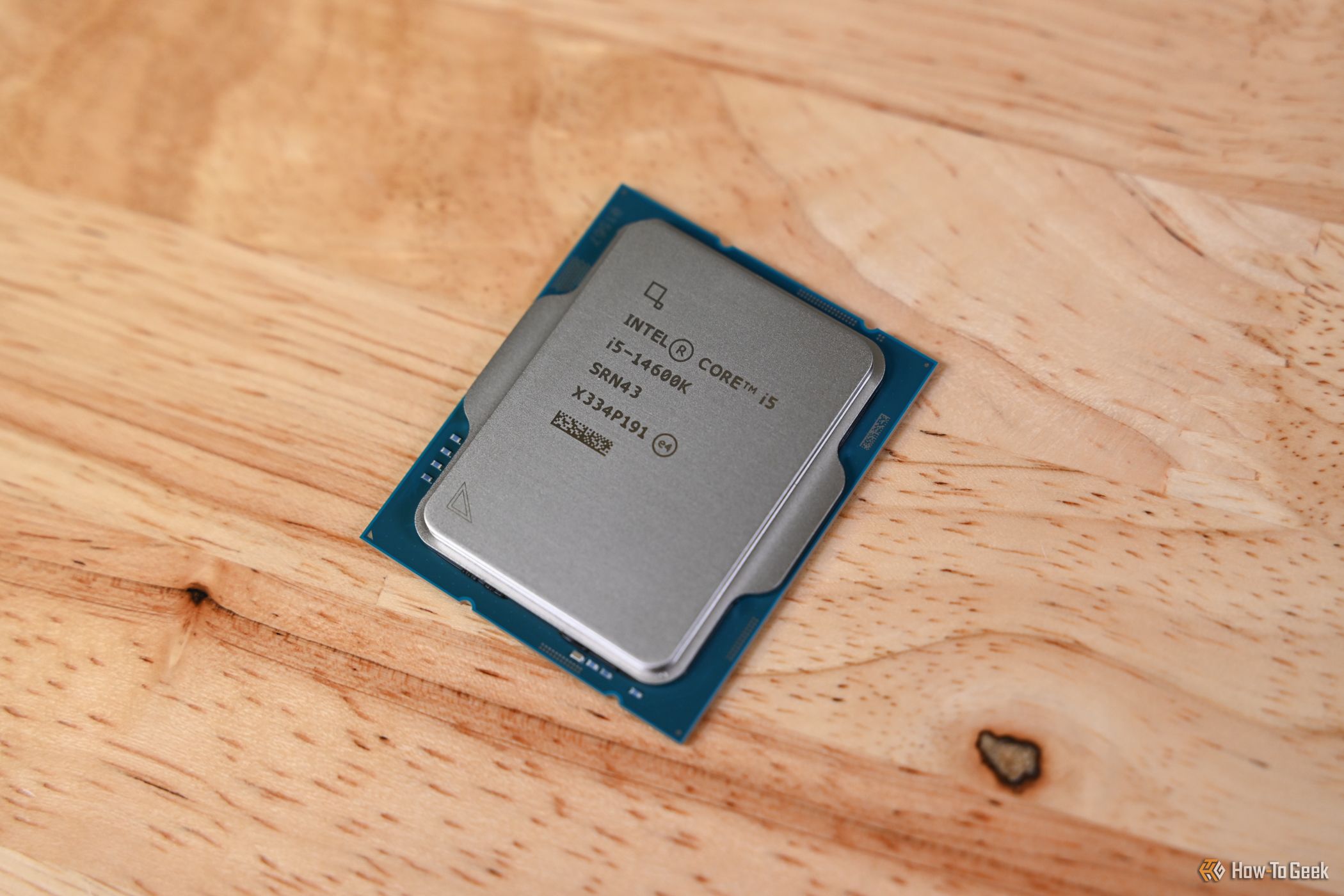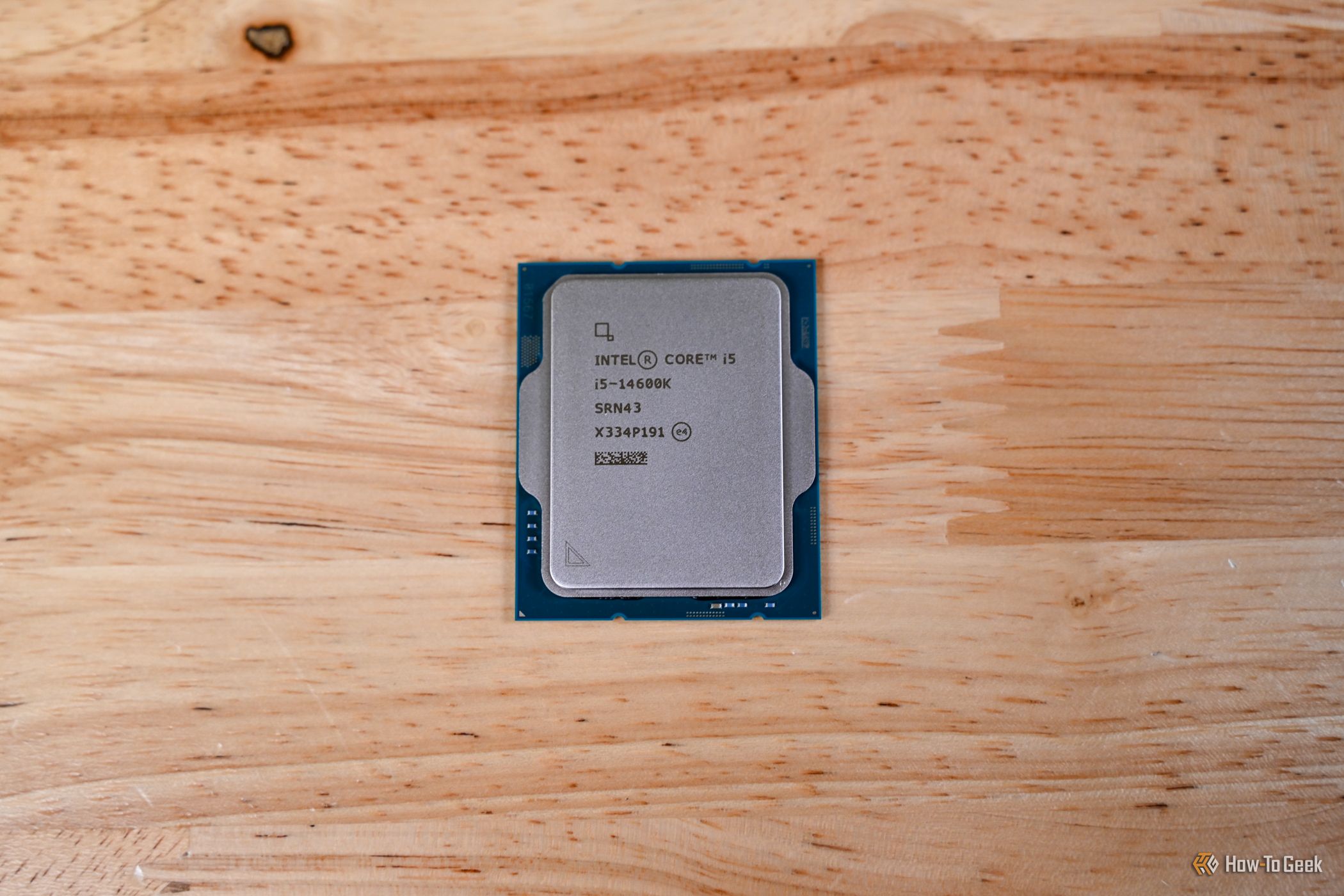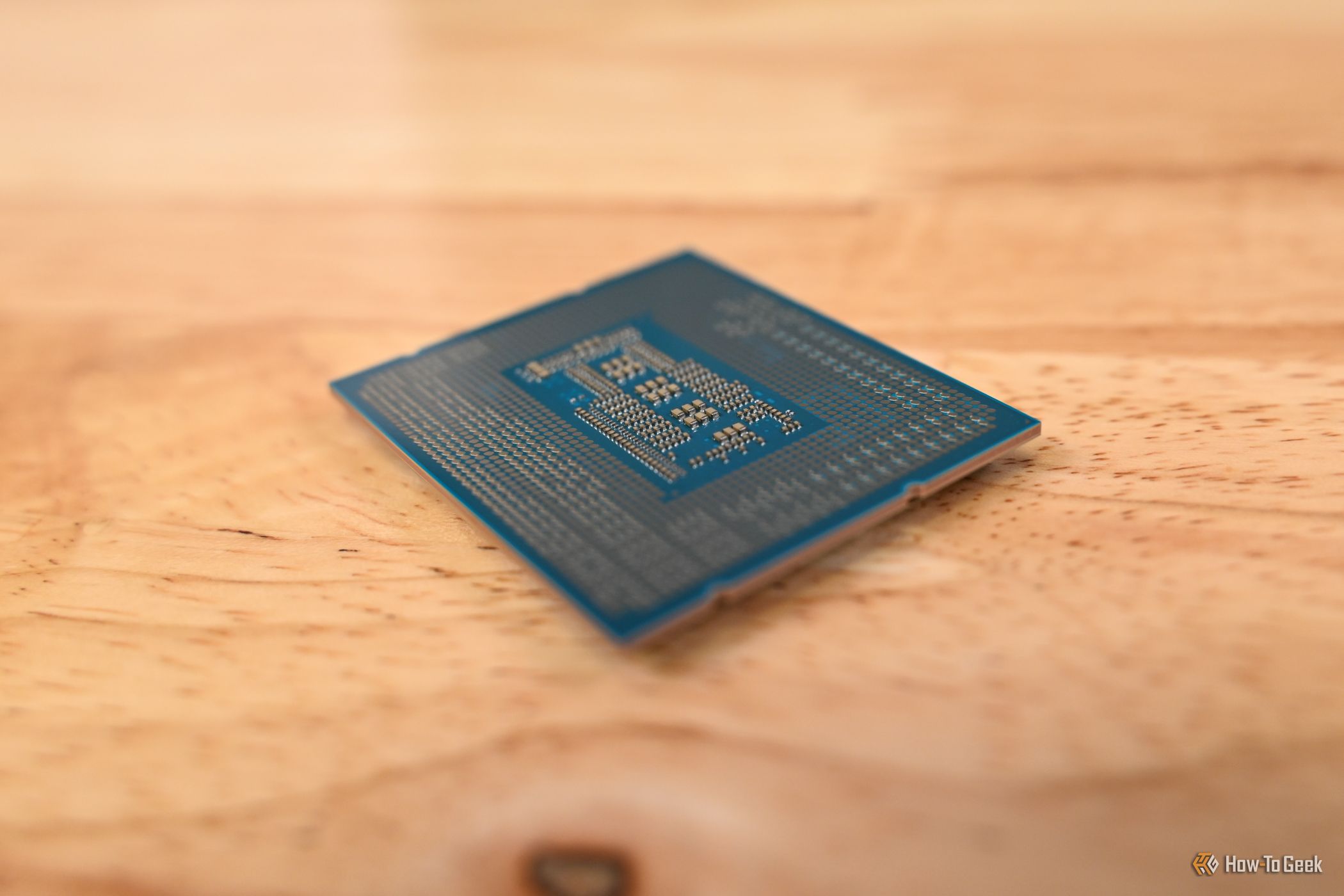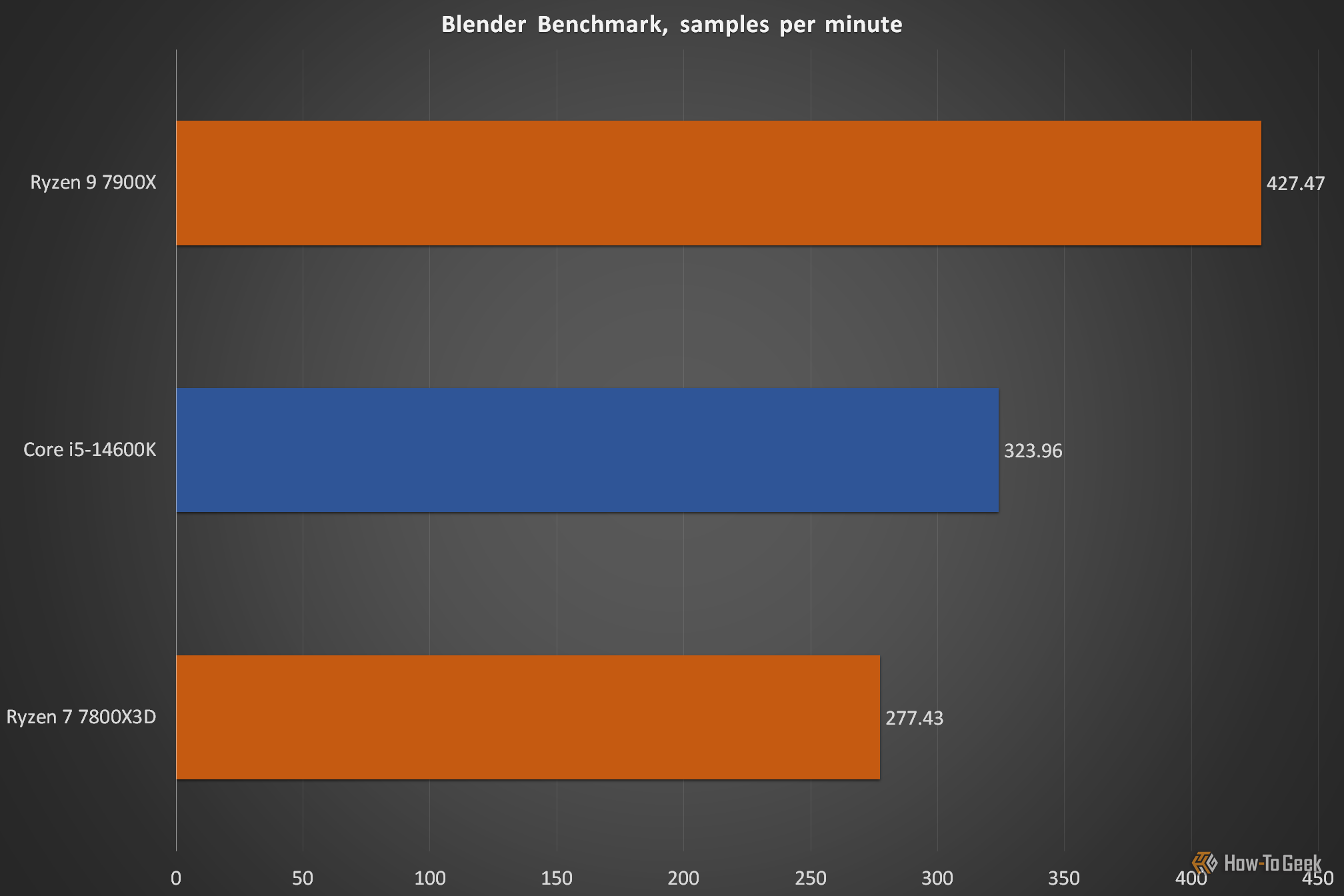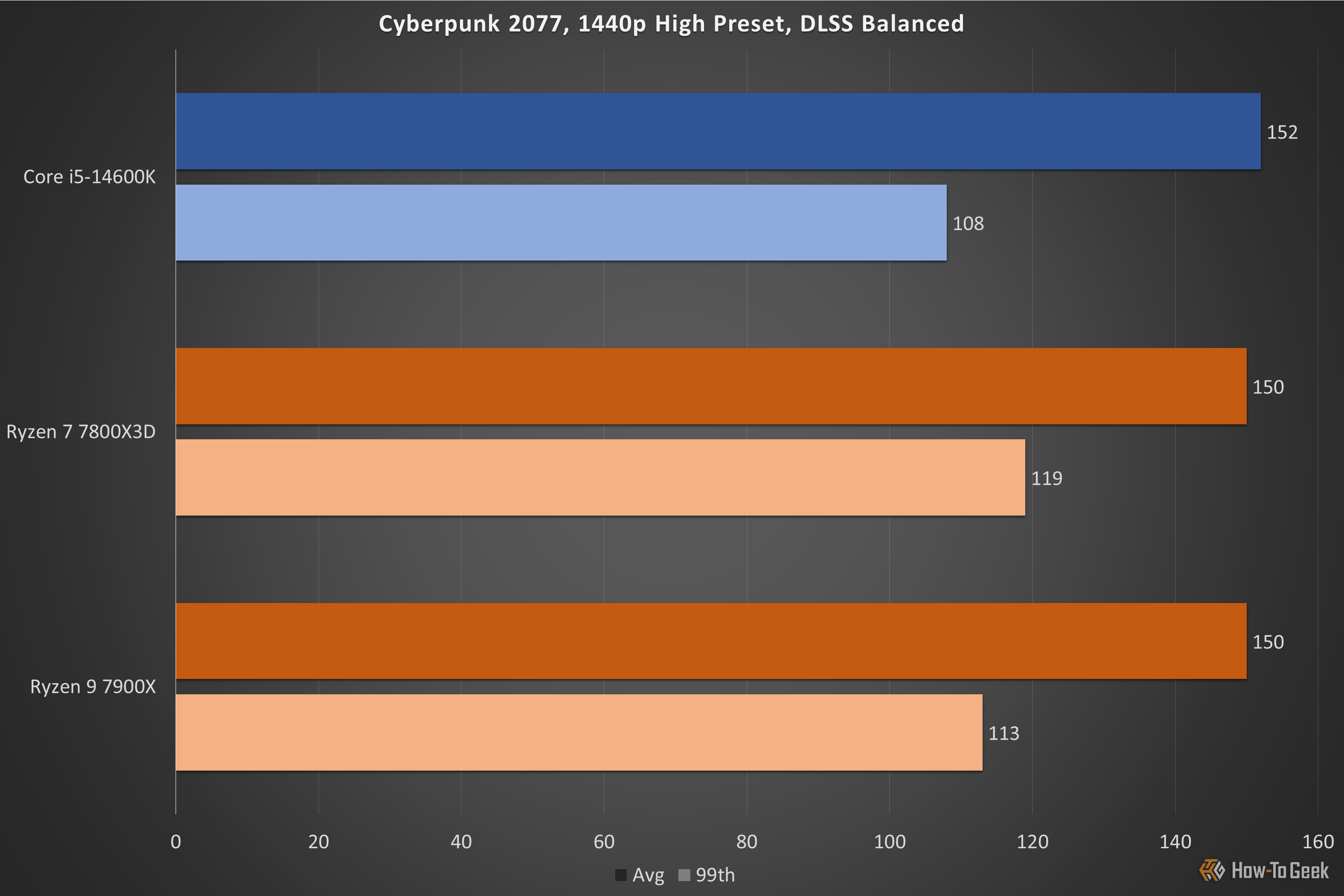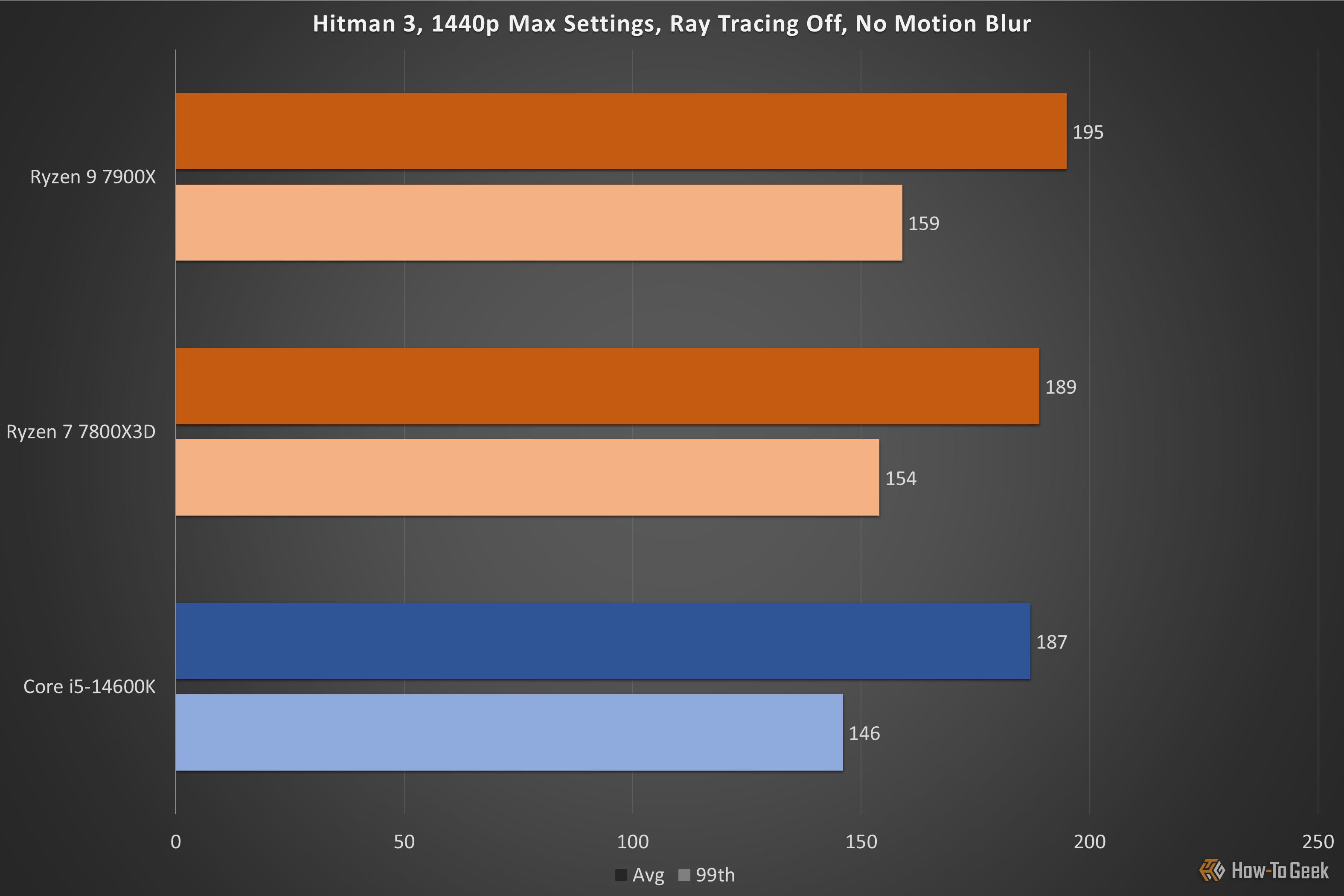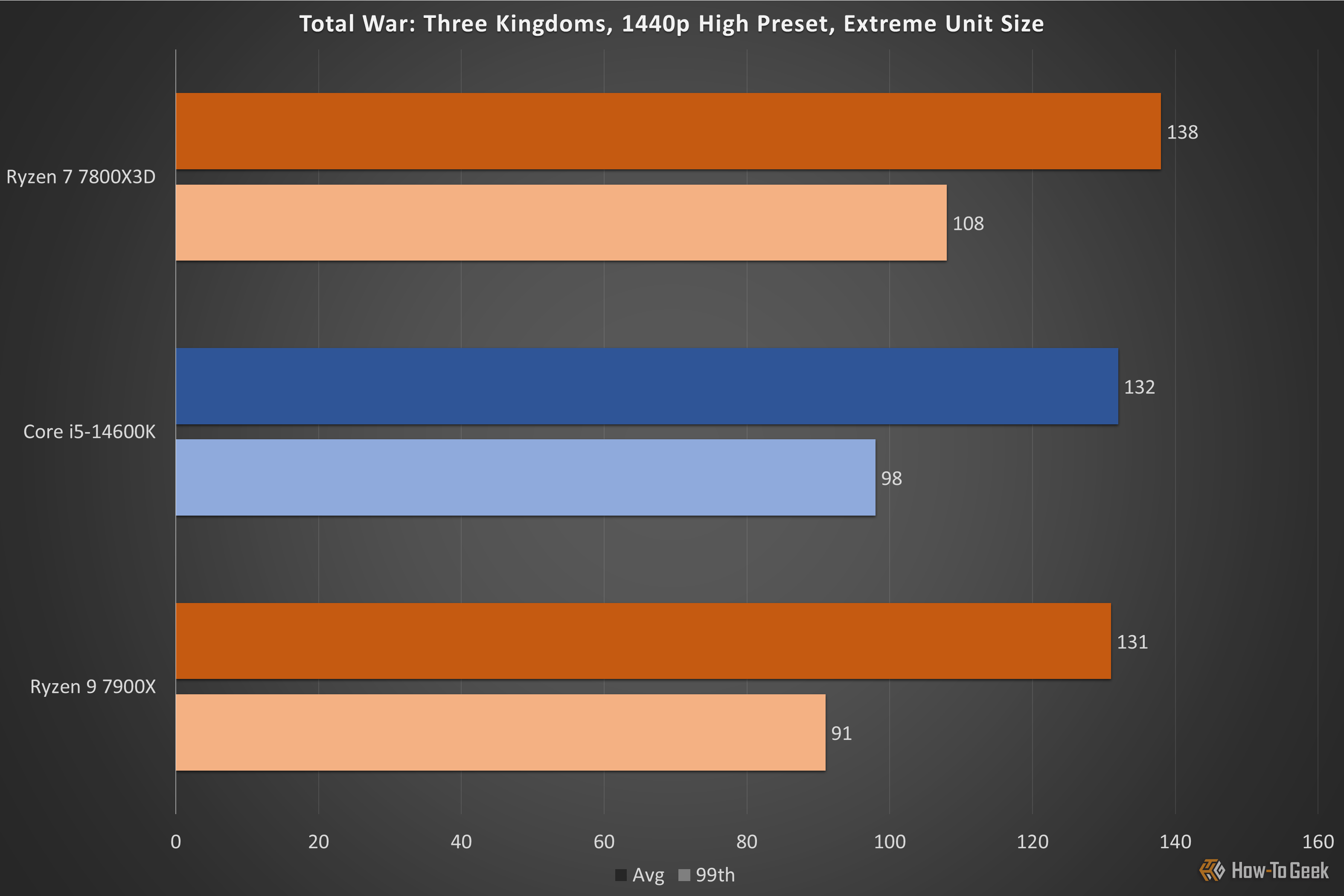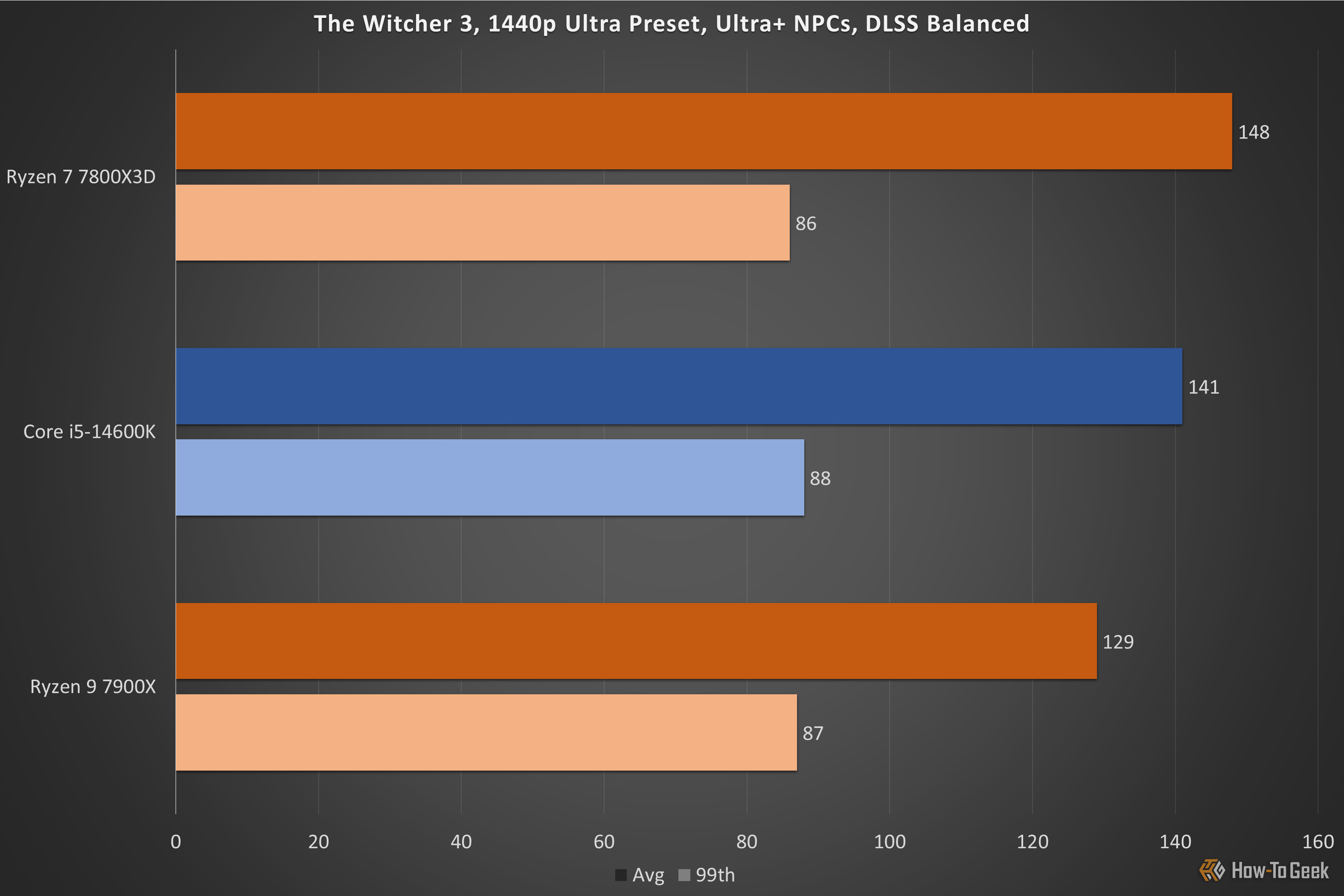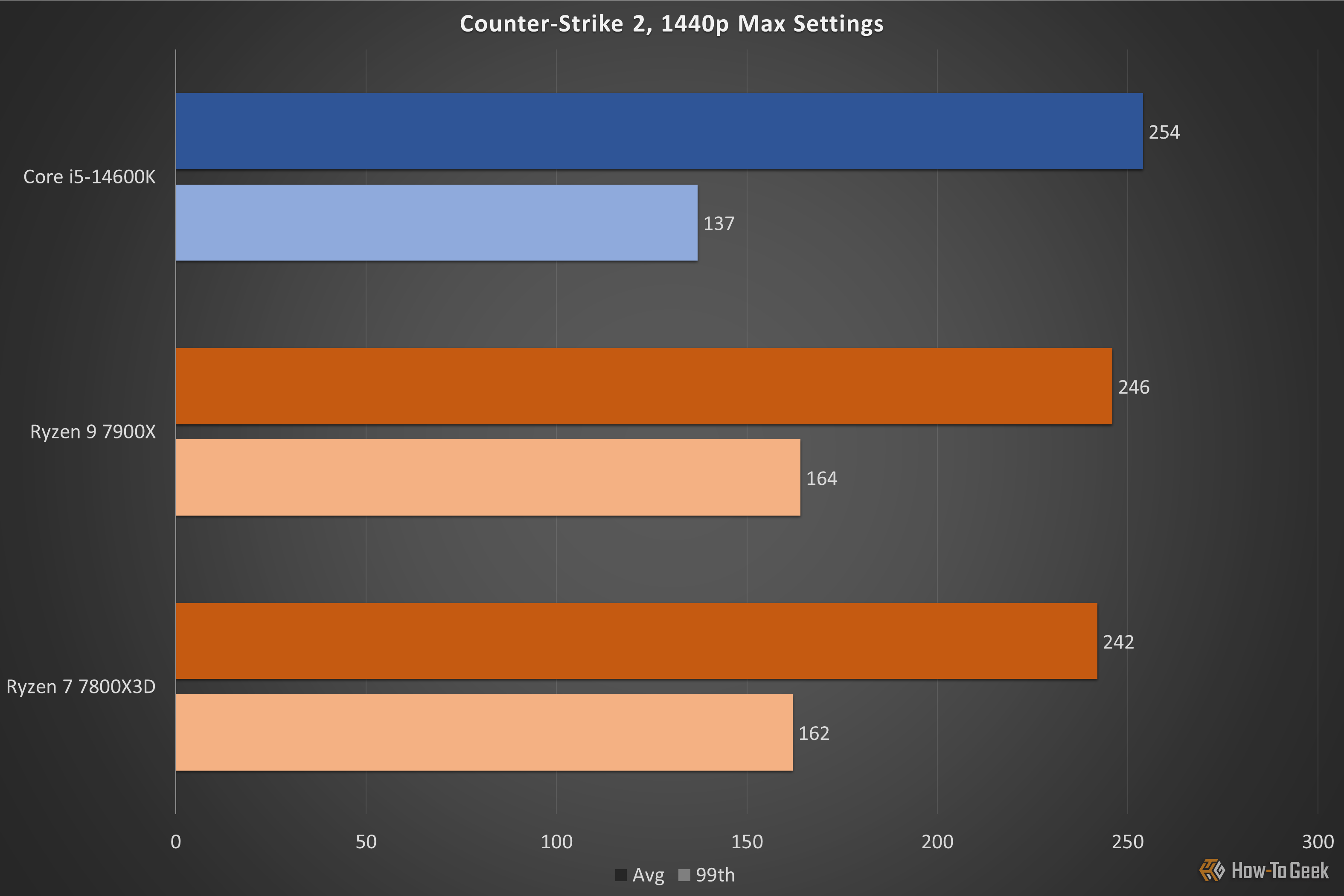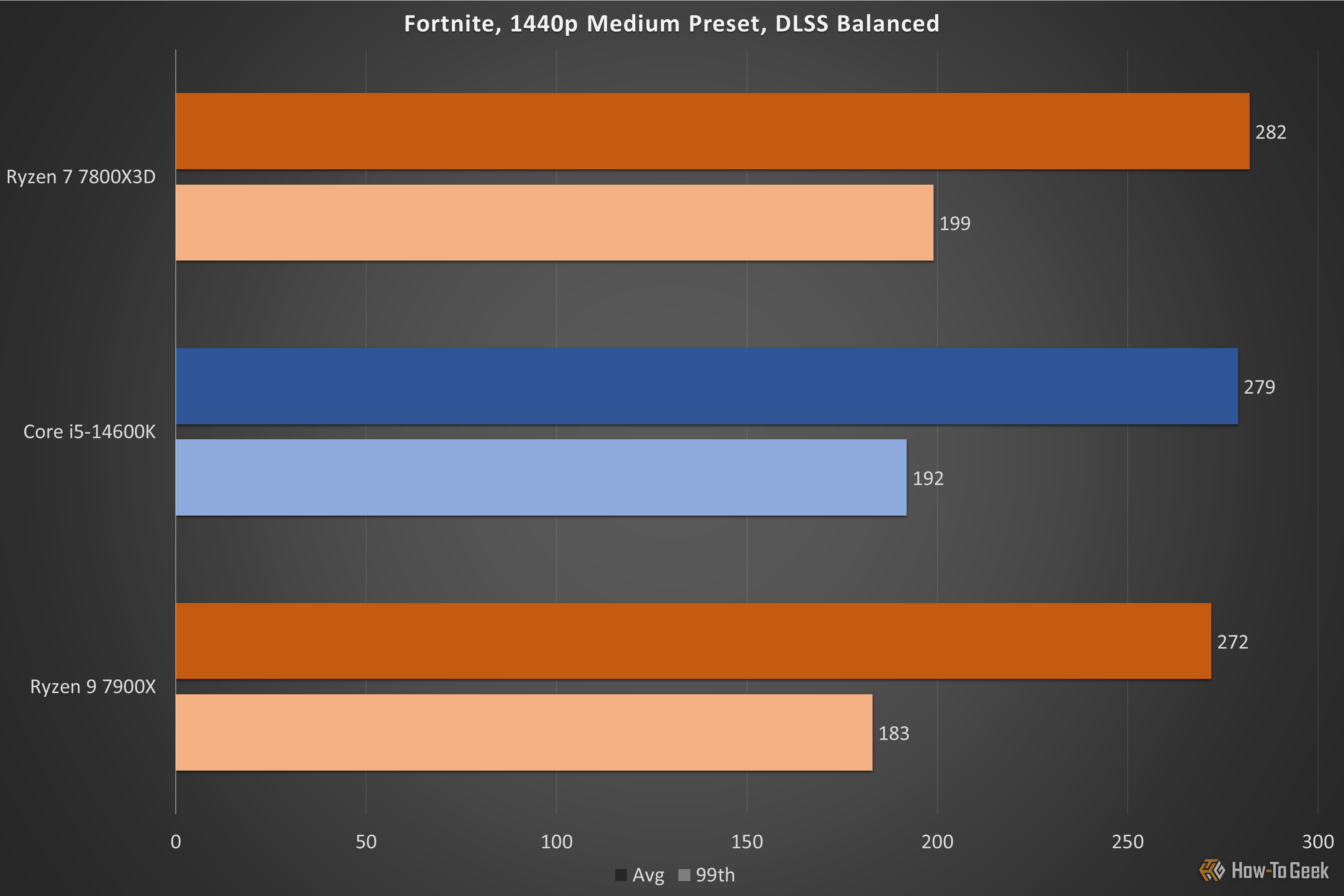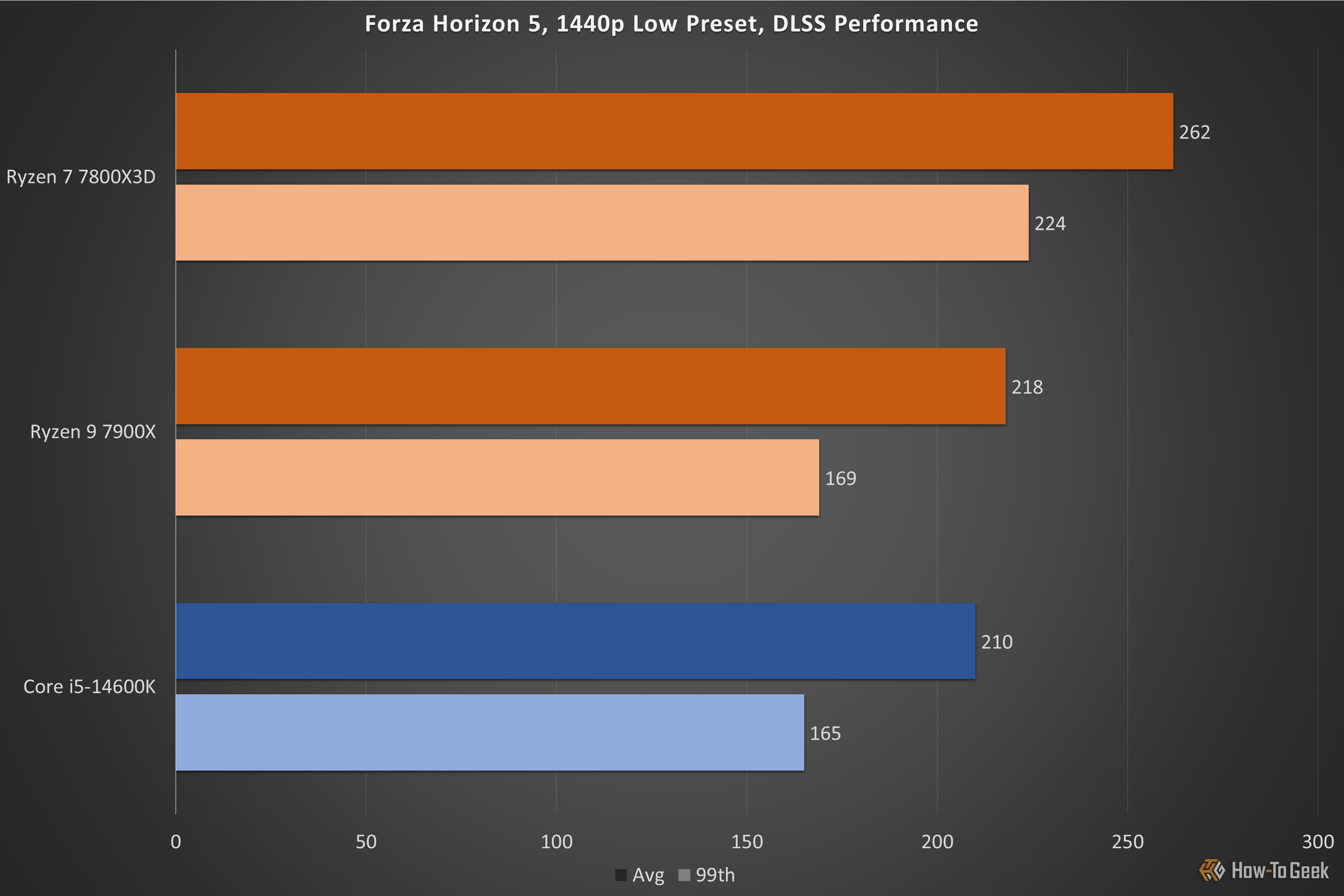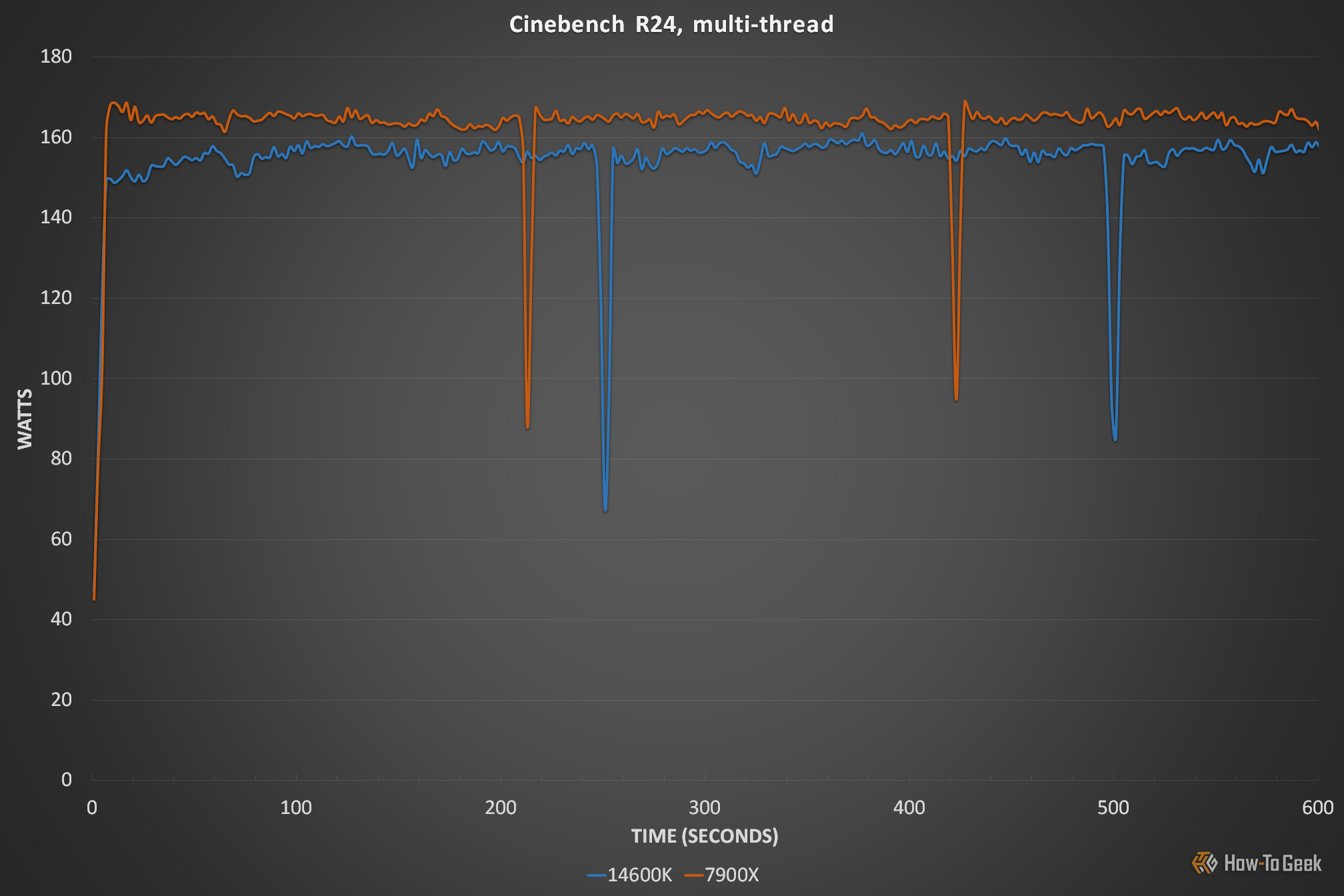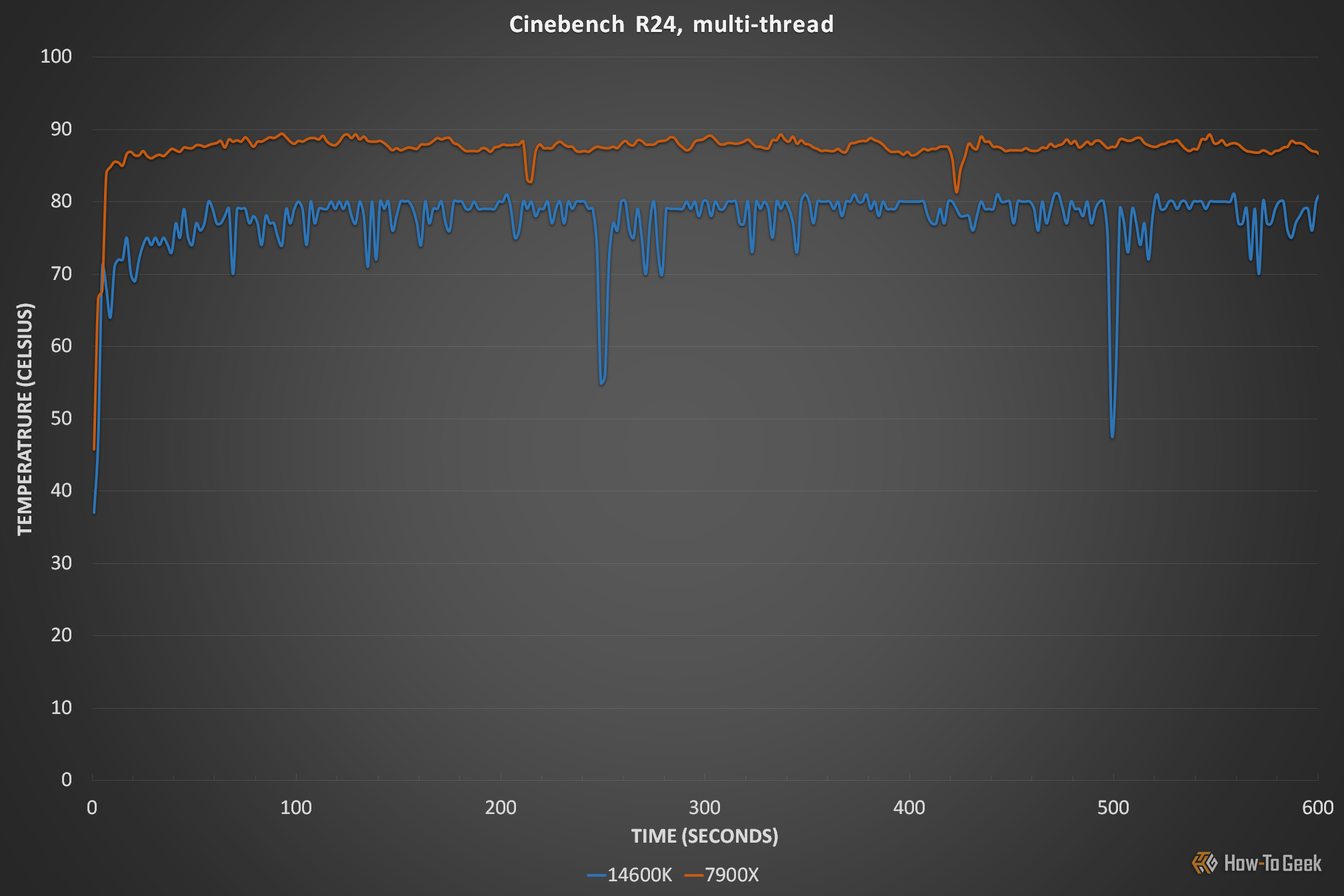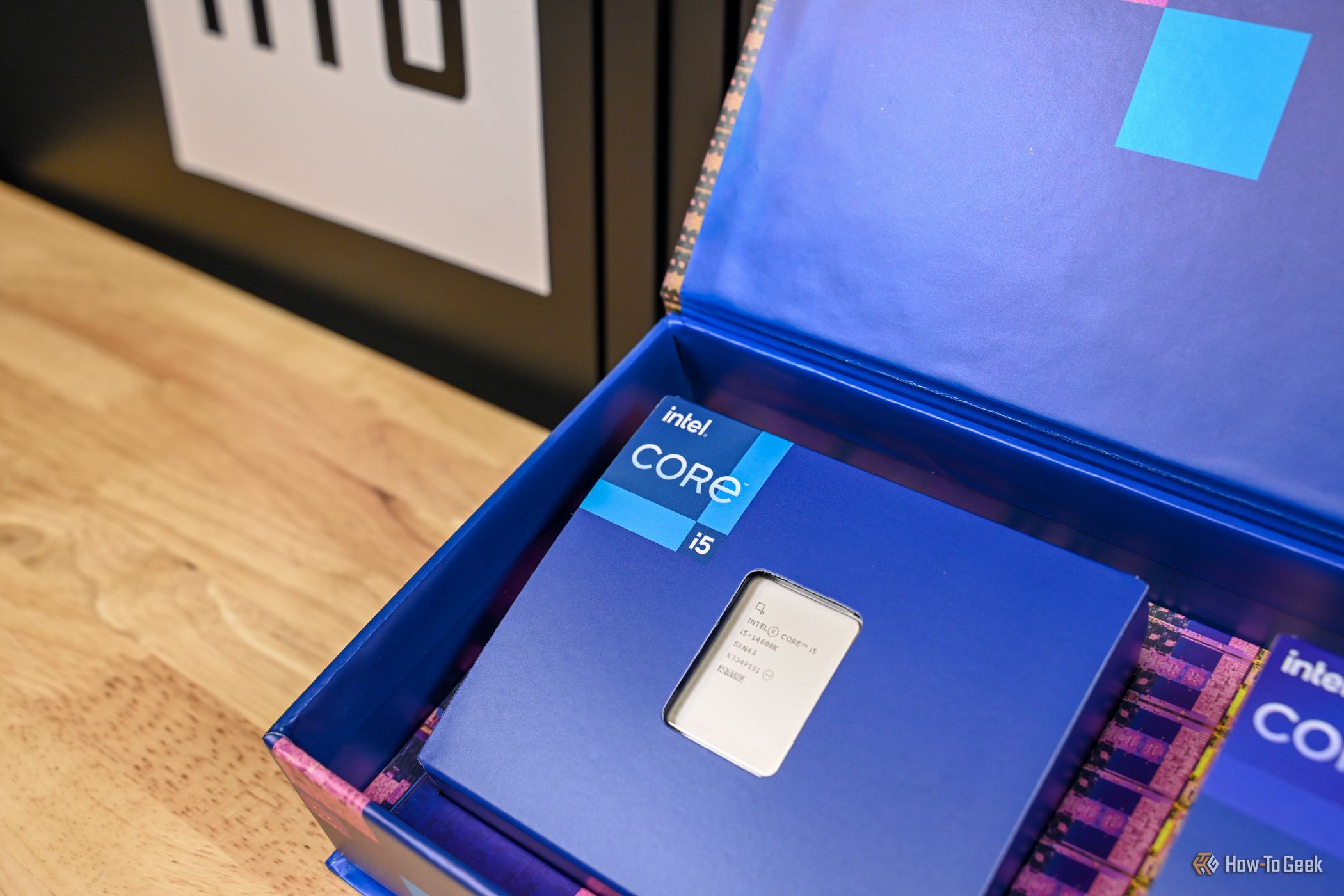Key Takeaways
- Intel's Core i5-14600K is a refresh of the Core i5-13600K with higher clock speeds, offering good single- and multi-threaded performance.
- The 14600K's increased price compared to the 13600K makes it less competitive and not the midrange champion it could have been.
- The 14600K's underlying technology is outdated, and it's likely to look obsolete compared to next-gen Intel and AMD CPUs in 2024.
Intel's Core i5-13600K is one of the company's most celebrated CPUs in a long time. It's got great performance, a great price tag, and acceptable though second-place efficiency. It would have been great if Intel followed this chip up with one of its upcoming Meteor Lake CPUs, but unfortunately, Intel has decided that Meteor Lake doesn't belong on the desktop. That left Intel with one option for its 14th-generation CPUs: refresh its 13th-generation Raptor Lake chips. The Core i5-14600K isn't so much a successor to the 13600K, but a 13600K with a new name.
That being said, the 13600K was a good chip and with the 14600K being a slightly improved version, it's also a good chip. However, the 14600K's increased price means it's just not going to be the midrange champion the 13600K is right now, at least not until we start seeing discounts. If that wasn't bad enough, the 14600K's underlying technology is clearly showing its age, and since both AMD and Intel are preparing to launch truly next generation products in 2024, it's clear that the 14600K is probably going to look pretty quaint about a year from now.
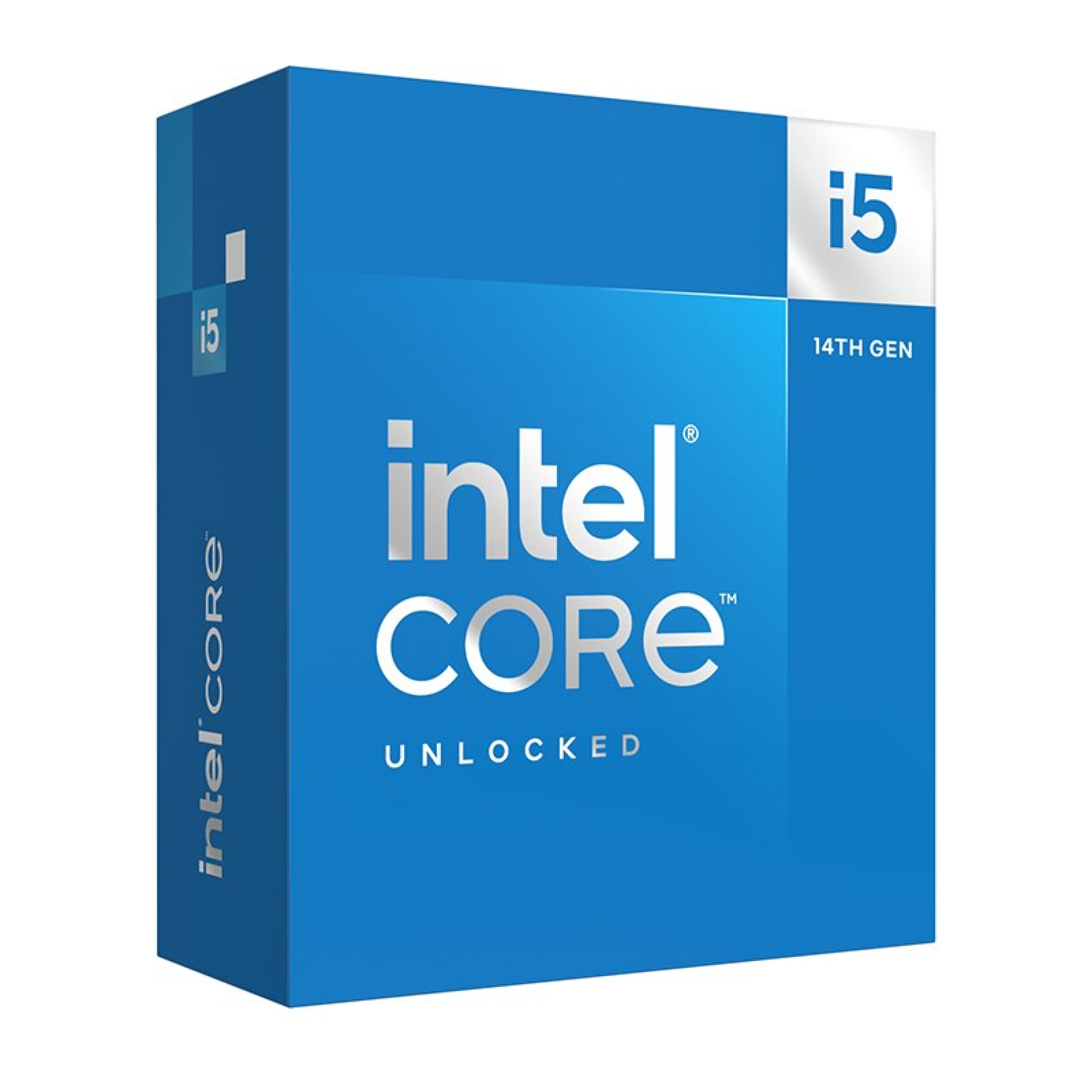
Intel Core i5-14600K
Intel's Core i5-14600K is a refresh of its popular Core i5-13600K, featuring the same cores and architecture but also higher clock speeds.
- Brand
- Intel
- CPU Model
- Core i5-14600K
- CPU Socket
- LGA 1700
- Cores
- 6P+8E
- Threads
- 20
- Architecture
- Raptor Lake
- Process
- Intel 7
- Socket
- LGA 1700
- Base Clock Speed
- 3.5GHz
- Boost Clock Speed
- 5.3GHz
- Cache
- 24MB L3+20MB L2
- RAM
- DDR4, DDR5
- PCIe
- PCIe 5.0
- Graphics
- Intel UHD Graphics 770
- TDP
- 181W
- Good single- and multi-threaded performance
- LGA 1700 motherboards are better value than AM5
- Practically a 13600K that costs more for little gain
- Next generation Intel and AMD CPUs not far away
- Worse power efficiency than Ryzen 7000
Intel Core i5-14600K Price and Availability
By the time you're reading this review, the Core i5-14600K will already be available for purchase. It's officially going for $320, though initially, it's likely low supply will lead to higher prices, which is the norm for the launch of any CPU. But given that the 14600K is practically just a binned 13600K and there are plenty of those, I wouldn't be super surprised if the 14600K bucked the usual trend.
Even at $320 though, this is a fairly expensive CPU. Sure, it is lower than the 13600K's official price tag of $330, but right now on Amazon it's going for $285 and that's the number that matters. I expect the 14600K to drop in price in the coming months due to this lack of competitiveness, but on launch day the 14600K will cost $40 or more than the 13600K, despite them being extremely similar.
Intel Core i5-14600K Specifications
As a refresh of the Core i5-13600K, the specs of the 14600K shouldn't come as a surprise. It's built on the same Intel 7 (formerly 10nm) process, uses the same Raptor Lake architecture, has the same core count, and has the same amount of cache but does have a slight clock speed improvement.
Core i5-13600K | Core i5-14600K | |
|---|---|---|
Cores | 6P + 8E | 6P + 8E |
Base/Boost Frequency (P-cores) | 3.5GHz/5.1GHz | 3.5/5.3GHz |
Base/Boost Frequency (E-cores) | 2.6/3.9GHz | 2.6/4GHz |
Cache | 24MB L3 + 20MB L2 | 24MB L3 + 20MB L2 |
Max TDP | 181W | 181W |
It's hard to not be a little disappointed with what we're getting here. Although Intel didn't follow up Alder Lake with Meteor Lake like it probably intended to, 13th-generation Raptor Lake CPUs in 2022 were surprisingly good despite only offering more cache and cores. 14th-generation Raptor Lake Refresh CPUs are something of a throwback to Intel's infamous 7th-generation Kaby Lake CPUs from 2017, which were straight up a refresh of 6th-generation Skylake chips but with higher clock speeds.
Still, there's a pretty big difference between now and 2017: AMD isn't all that competitive. Sure, AMD unquestionably has the better technology with Ryzen 7000, but you're paying quite a bit more for it. That has allowed 13th-generation CPUs like the 13600K to stay pretty competitive against AMD's alternatives, and even at its launch price, the 14600K is still somewhat good competition for Ryzen 7000.
Test Bench Setup and Methodology
For this review, I not only benchmarked the 14600K but also two of AMD's competing Ryzen 7000 chips: the Ryzen 7 7800X3D and the Ryzen 9 7900X. These two AMD CPUs are a fair bit more expensive than the 14600K, which they would have to justify with significantly better performance. All CPUs were tested under the same conditions and with the same hardware (except for the motherboard, obviously).
Motherboard (Intel/AMD) | ASRock Z790 Taichi Lite/Asus TUF Gaming B650-Plus |
|---|---|
GPU | Nvidia GeForce RTX 3070 Ti Founder's Edition |
RAM | G.Skill Flare X5 DDR5-5600 CL40-76 32GB |
SSD | Corsair MP600 Pro NH 2TB |
CPU Cooler | Thermalright Phantom Spirit 120 SE |
While motherboard settings between Intel and AMD CPUs vary significantly, wherever possible I enabled performance-increasing settings like multicore enhancement for the 14600K and Precision Boost Overdrive for the 7800X3D and 7900X. These settings are enabled by default on most motherboards, and it's recommended to enable them anyway to get better performance. Of course, these settings increase both performance and power draw, which I will consider and analyze in this review.
When it comes to handling all that heat, I decided to set the Phantom Spirit CPU cooler to operate at 100% fan speed at all times. Additionally, I also tested at an ambient temperature of 70F or 21C, which I maintained and monitored thanks to central A/C. These two conditions, plus the fact that my test bench is open air, may be unrealistically cool for many users, but a higher-end cooler (like a $100+ AIO liquid cooler) would achieve the same effect anyways regardless of high fan speed, ambient temperature, or open-air cooling.
For gaming benchmarks, the GPU is a pretty important component for achieving accurate results, and generally a faster GPU is better for this. Although the RTX 3070 Ti is clearly a midrange GPU by today's standards, it was overclocked by 200MHz on the graphics chip and 1700MHz on the VRAM to push it close to the performance of the RTX 3080. While this is a far cry from the RTX 4090, I have mitigated and controlled for weaker graphics performance with my carefully crafted methodology for game benchmarks.
My methodology for testing games is pretty simple. I tweaked the graphics settings of each game so that the 7800X3D could achieve at least 120FPS on average in five games and at least 240FPS in the other three. I then tested the 14600K and 7900X at those same graphics settings. The point of this is to set up the 7800X3D, one of the fastest gaming CPUs today, as a control or standard that I could compare the other CPUs against. Testing like this also prevented the 3070 Ti from impacting the results, since I could have used any GPU to achieve these framerates.
Admittedly, it's true that benchmarking this way can result in GPU bottlenecking instead of CPU bottlenecking, and many would argue that a CPU gaming benchmark isn't valid if it's not CPU bottlenecked. However, in many games a CPU will only bottleneck (or to put it another way, reach its limit) once you've hit a few hundred frames per second. Very few games offer settings that actually impact CPU performance, but any CPU will eventually be overwhelmed by needing to process a large number of frames, hence many CPU reviews that test at very low resolutions and settings.
The thing is, real PC gamers tend to game at high quality graphics settings and lower framerates (even as low as 60 FPS), which is why I haven't arbitrarily chosen quality settings to simply pump the framerate up. With all that in mind, the gaming benchmarks are set up to determine if the 14600K is slower than the 7800X3D in a realistic gaming scenario, and by how much, if it is slower.
As for other software-related business, I updated Windows, applications, games, and drivers to the latest version as of October 9. I also disabled VBS, a setting that is known to cause problems for gaming performance, and enabled the high-performance power plan, which can help boost performance a little. With all that out of the way, let's get to the results.
Intel Core i5-14600K Performance: A Jack of All Trades
The applications I've tested include Cinebench R23, Cinebench 2024, the official Blender benchmark, and eight different games from a wide variety of genres and release dates. While these benchmarks won't show you how these CPUs will perform in every scenario and edge case, they should give you a good overview of the kind of performance you should expect in the vast majority of cases.
Cinebench R23, Cinebench 2024, and Blender
Starting with Cinebench R23, we see the 14600K fits right between the 7900X and 7800X3D in the multi-threaded test, but in the single-threaded test the 14600K just barely comes out on top. While this is a loss for the 14600K on the whole, it's showing much better bang for the buck than the 7900X and especially the 7800X3D.
The margins in Cinebench 2024 aren't very different, though the 14600K does lose a little ground in the single-threaded test, which means the 14600K tied the 7900X rather than getting a slight victory like in Cinebench R23.
In Blender, the performance margins are largely the same as the multi-threaded tests in Cinebench R23 and 2024. The 14600K is still right in the middle, which is again a good result considering its price.
120+ FPS Gaming Benchmarks
Performance of the in-game "Cyberpunk 2077" benchmark was pretty similar across the board, and while the 14600K technically is on top here, it's only by two FPS, and its noticeably lower 99th percentile framerate (which basically measures how consistent the framerate is) realistically puts the 14600K in last place. However, I'd chalk this result up as a tie overall, since 108FPS against 119FPS in 99th percentile FPS isn't that much of a difference.
The 14600K loses to both the 7800X3D and the 7900X in the Berlin map of "Hitman 3," which features dozens of NPCs in a small area. However, the 7800X3D is only single digits ahead of the 14600K, and the 7900X is barely any faster at all.
Despite testing "Shadow of the Tomb Raider" in the Cozumel area, which is super CPU intensive due to all the NPCs around, it's a wash here. Pretty much any modern CPU and GPU can run "Shadow of the Tomb Raider" pretty well though, so this result isn't very surprising.
Most "Total War" games rely on a good CPU for achieving good framerates, and "Total War: Three Kingdoms" is no different. Still, all three CPUs are pretty close together here, though the 7800X3D is clearly faster than both the 14600K and 7900X (though not by much), which performed about the same.
The last lower-framerate game I have to show is "The Witcher 3," which I tested in the DirectX 12 mode that was added in 2022 to introduce support for ray tracing and upscaling technologies. I tested in Novigrad, which is the most CPU-intensive area in the game due to all its NPCs. Interestingly, all CPUs had roughly the same 99th percentile framerate but differed quite noticeably in average framerate. The 14600K is ahead of the 7900X here but couldn't quite catch the 7800X3D.
240+ FPS Gaming Benchmarks
Our first of three high-framerate benchmarks is the newly released "Counter-Strike 2," which should be much more CPU optimized than "Counter-Strike: Global Offensive" since CS2 uses the modern Vulkan API while CS:GO used DirectX 9. Although the 14600K had a higher average framerate here, its 99th percentile framerate was much poorer than both the 7800X3D and 7900X. Both AMD CPUs offer a somewhat smoother experience.
In "Fortnite," the 14600K almost caught up to the 7800X3D and was slightly ahead of the 7900X. You'd probably have a hard time telling any of these CPUs apart, but it is nevertheless a positive result for the 14600K.
However, both the 14600K and 7900X could not catch up to the 7800X3D at all in "Forza Horizon 5." The 7800X3D is clearly much better not just when it comes to the average framerate, but also the 99th percentile. That being said, the 14600K was only slightly behind the 7900X, which is an okay result.
The overall picture for the 14600K is positive when it comes to performance. There are only three games where the 7800X3D has a clear advantage over the 14600K, but in only one of them ("Forza Horizon 5") was the performance difference so big that it would be noticeable to the typical gamer. Meanwhile, it's clearly the much faster CPU in anything that heavily relies on raw single- or multi-threaded performance, both of which are weak spots for the 7800X3D.
As for the 7900X, it's definitely the better multi-threaded CPU with nearly a 20% performance advantage in Cinebench and Blender, but if you're just gaming, the 14600K is going to be about the same. Even if you're doing absolutely no gaming, the 14600K still has far better bang for your buck than the 7900X since it's so much cheaper than it is slower.
Power Consumption and Thermals
I also measured power and temperature on the 14600K and 7900X while running Cinebench 2024's multi-threaded test, since these two CPUs are pretty close in multi-threaded performance. This data was taken from HWInfo, a statistics app, and while that's technically not as accurate as using a tool to measure power drawn from the outlet or on the CPU power cables, it's accurate enough for something this simple.
The 14600K and 7900X averaged 154 and 163 watts respectively, though, in Cinebench R23 and other intensive benchmarks, the 7900X usually averaged around 170 watts instead. Either way, the 14600K consumed less power here, but had worse power efficiency due to its relatively low score. That's not surprising though, the 7900X is manufactured on TSMC's 5nm process, which is a full generation ahead of the Intel 7 process.
By contrast, the 14600K had superb power consumption when not under heavy load. At idle, I often saw the 14600K consume a single-digit amount of watts, and when doing basic stuff like web browsing and navigating the file explorer, I only saw power consumption of around 10 to 30 watts, usually towards the lower end of the spectrum. Meanwhile, the 7900X rarely ever dipped below 30 watts, and often spiked to more than 50 watts depending on what I was doing.
Despite only consuming a few watts less than the 7900X, the 14600K has much better thermal performance, averaging about 77C compared to the 7900X's 87C. Ever since AMD switched to chiplets for its desktop CPUs, Ryzen has been extremely difficult to cool. Cinebench 2024 is actually an unusually good result for the 7900X due to its slightly lower power consumption; in Cinebench R23, it regularly runs at 90C or so.
Additionally, the 14600K's temperature at idle or low loads is also much better. You can actually see in the temperature chart that the 14600K started at 37C while the 7900X started at 47C. Usually, the 14600K hovered in the low 30s (C), while the 7900X ranged from the 40s to the 50s despite the Phantom Spirit cooler operating at 100% fan speed. This is because the 7900X also has much worse idle and light workload power consumption, which compounds the already difficult cooling situation for Ryzen CPUs.
Should You Buy the Intel Core i5-14600K?
You should buy the Intel Core i5-14600K if:
- You want a CPU that performs well in most things
- You want to save money on the CPU, RAM, and motherboard
- You don't need anything super high-end
You shouldn't buy the Intel Core i5-14600K if:
- The Core i5-13600K is available for a lower price
- You need top-end multicore performance and have the budget for it
- You want a multi-generational upgrade path with lots of choices
On paper, the desktop version of Meteor Lake (which was canceled some time ago) sounds far more appealing than a refresh. It would have meant a brand-new architecture featuring the cutting-edge Intel 4 (formerly 7nm) process, more efficient and powerful cores, and a new socket with support for at least two generations of Intel CPUs. But would it have been priced as competitively as 13th- or even 14th-generation Raptor Lake chips? I have my doubts, which is why I don't mind 14th-generation CPUs too much, even though they're priced high at the moment.
While there's nothing wrong with Intel recommitting to a highly praised product stack even if the Core i5-14600K is boring, this CPU has one major problem: its price. The 14600K is way too expensive to be worth buying over the Core i5-13600K when the performance is going to be pretty much the same across the board. Plus, 14th-generation chips will be the last CPUs LGA 1700 will ever get, so if you build a brand-new PC using the 14600K, your upgrade choices are pretty limited without getting a new motherboard.
Eventually, the 14600K will cost as much as the 13600K does right now. The problem is, you're going to have to wait for that, and by the time that happens, that current generation Ryzen 7000 CPUs might look more appealing, or we'll finally have next-generation Intel and AMD CPUs. If you're in the market for a great midrange CPU, the 13600K is what you'll want. The 14600K is just too expensive and too similar to make sense at its current price.

Intel Core i5-14600K
Intel's Core i5-14600K is a refresh of its popular Core i5-13600K, featuring the same cores and architecture but also higher clock speeds.

